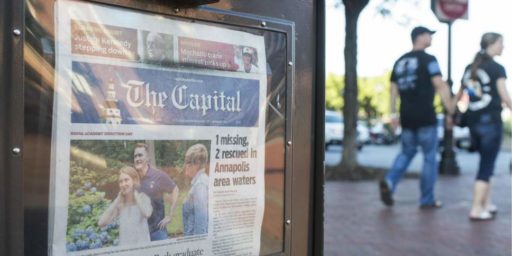LA Times Going Under?
A sign of the Times.

CNN Business (“The Los Angeles Times plunges into ‘chaos’ as brutal layoffs loom and senior editors call it quits“):
The Los Angeles Times is in disarray.
The Dr. Patrick Soon-Shiong-owned newspaper, which houses the largest newsroom in the western U.S., has been thrown into a state of mayhem as severe layoffs loom and senior editorial leaders abruptly call it quits.
“I cannot overstate the level of chaos,” one staffer, who requested anonymity because they were not authorized to speak publicly, candidly told me on Monday.
To say that it has been a rocky start to the new year for the venerable news outlet would be an understatement. Earlier this month, Kevin Merida suddenly announced that he was departing his post as executive editor after less than three years on the job. Then, news of forthcoming mass layoffs ensued, prompting the employee’s union to stage a historic one-day walk out on Friday. The LAT’s Meg James reported last week that management could slash upwards of 20% of the newsroom — or roughly 100 positions — with the looming layoffs, though a person familiar with the matter warned to me on Monday that it could ultimately end up being “much worse” than that.
Meanwhile, amid the backdrop of bedlam, the team of four managing editors — Julia Turner, Sara Yasin, Scott Kraft, and Shani Hilton — tapped to oversee operations in the wake of Merida’s departure has also been rocked by departures. Two of the four members, BuzzFeed News alums Hilton and Yasin, have in recent days exited the newspaper, contributing even further to the turmoil that has enveloped the newsroom.
“We have a billionaire who doesn’t understand media and thinks he can cut his way to success,” another staffer told me, likening the drama playing out in the editorial leadership to the reality television show “Survivor.”
Seeking to provide the newsroom with some sense of stability, Turner emailed staffers on Monday announcing that she would oversee daily editorial operations with Kraft and absorb all of Hilton’s direct reports. Notably, Turner was not shy about the grim reality confronting the newspaper, writing to employees, “Scott and I are now responsible for all editorial operations, and we’re advocating for editorial interests in conversations with the company about the financial crisis we face.”
Beyond the drastic cuts hanging over the newsroom, it’s unclear what Soon-Shiong is doing behind the scenes to stable his ship. The biotech billionaire purchased The LAT in 2018, pouring nearly $1 billion into the storied paper and vowing to steer it into the future after enduring years of tumult under Tribune Publishing. But in the words of the newspaper’s own leadership team, years later under his stewardship it is in a dire state of “financial crisis.”
Nieman Labs (“The LA Times lays off 115 people, with the De Los and Washington, D.C. teams especially hard-hit“) adds:
The Los Angeles Times laid off 23% of its newsroom on Tuesday — one of the largest cuts in the paper’s 142-year history, according to the paper’s own reporting. Around 385 newsroom positions remain.
“We are not in turmoil. We have a real plan,” the paper’s owner, billionaire businessman Dr. Patrick Soon-Shiong, told L.A. Times reporter Meg James. (The story did not elaborate on the plan.) The LA Times had laid off 74 people in June 2023.
The layoffs followed reports that the Times lost “$30 million to $40 million” last year.
For most of the time I’ve been writing on this blog—which will be old enough to drink a week from today—newspapers and magazines have been in trouble. The old business model of cheap subscriptions supported by advertising was disrupted by Craig’s List and others and very few publications have succeeded in replacing that with a subscription-only model.
Those few who have figured it out are almost exclusively niche publishers offering unique content that make people money; i.e., mostly trade publications. The LAT is a great general interest paper but likely didn’t offer enough value for the average Los Angelino—much less someone not living in the city—to justify a subscription price high enough to sustain publication.
I have no opinion on Soon-Shiong—indeed, I’m not sure I had heard of him before this morning—but the billionaire investor is one model that would seem sustainable. After all, someone with that kind of money could presumably afford to lose $30- to $40-million a year to support the hobby and, indeed, should be able to write it off on his taxes. Buying a failing newspaper and expecting it to be profitable is just not logical.






Yikes, I grew up in the San Fernando Valley, so the Time’s was our family’s paper of choice for many years (well, still is, my sister adjusted my Mom’s subscription to Sunday only) making this news a bid sad to read.
I was going to say something snarky like if they keep degrading the newsroom staff for the paper, that they will end up as an on-line only publication that just creates listicles to try and attract web clicks, but as I finished up your post and noticed that a couple of ex Buszzfeed folks were among the folks who were laid-off or resigned, I said Ha!, the jokes on me.
Even the listicle folks have left to look for greener pastures.
Look, I may not like some of the folks that now write for the Washington Post, but it is still a pretty reputable paper to turn to for the news and Bezos is also richer than the big guy in the sky but he did not have to simply treat the paper as a hobby that is just a pure money loser and figured out a way for the paper to pull in some income on a regular basis.
The LAT will probably need to acknowledge that the mass lay-off was a bad idea after a bit of time (at least several months) has passed, and go into rebuilding the newroom mode. Hire some quality editors (poach them if they have to, the owner of the paper can afford to throw around some cash for truly quality hires), some on-staff news reporters, and do a great job vetting the freelancers they buy news from, and work closely with their marketing department to get more folks interested in paying to read the news in a digital format, it will be very difficult, but it can be done.
@inhumans99: I dunno. A billion dollars isn’t what it used to be.
I grew up reading the LA Times and the LA Herald Examiner – front to back – every day. Front to back every day – both papers.
The Examiner folded in 1989, and I was sad. Loved that paper. The Times started deteriorating around that time, but then got worse exponentially as the internet grew. By 2000, it was half it’s former size, due to lack of advertising. By 2010, it was half of that size.
But the L.A. Times, along with every other single newspaper, suffers from the same issue: By the time the newspaper rolls out at 7am, most of the news is a day old – literally. I bought an LA Times at a Starbucks about four months ago, and I already knew about every single story they had on the front page. It was day old news.
@EddieInCA: That’s because the value of a newspaper isn’t the physical newspaper, it’s the reporting. You know about every story because someone reported it. I’m not sure why physical newspapers exist any more, as difficult as I’m sure that is to the printers.
It’s why I was completely baffled by the story a few days ago of someone stealing every copy of a newspaper to protect the identity of a rape victim. A hundred years ago? Sure, maybe that would work. Now? Or even a decade ago? The internet and web is a thing.
I have to say, it may be true that a billionaire doesn’t know anything about media, but I think all the old-time print media guys don’t really know that much about how things work now, either.
This has been a bad, bad decade for newspapers. I would like to subscribe to a decent West Coast newspaper/website. I would rather not have the NY Times or the Washington Post be my go-to. They won’t cover local or regional news that I’m interested in.
Thing is, I can’t find one. The SJ Mercury-News is kinda ok (I used to subscribe in print for decades, but it’s a shadow of that now). I wss thinking the LA Times might be the one. Maybe not now, though.
Reporting does matter.
AND, we no longer need 200 reporters from all over the US reporting on national events. Twenty would be nice, and allow a broad range of views and representation.
This is the fundamental truth that the old school (and yeah, I’m old school, too) guys don’t seem to grasp.
I mean, it’s got to be tough to face that kind of obsolescence. I knew a man who was a typesetter. He was highly skilled. Then digital publishing happened. He never really recovered.
@EddieInCA: I forget who the wag was who referred to the newspaper as “Yesterday’s news in your bushes today” or some such.
How to run a newspaper. Citizen Kane
@Kevin:
Habit.
About half the time on the way to work I get handed a free paper. A tabloid format with 20 pages or so. I read it during lunch (another habit: reading when I eat). The days I don’t get one, I read an ebook or something else on my phone.
About the stolen papers, a piece I read on it this week suggested the alleged thief might have taken them by putting enough money in each vending machine to get all the copies. If that’s the case, is it even theft?
Granted the intent was still a fool’s errand to hide something. But I don’t think there’s a law against buying every copy of a publication, even if the intent is only to deprive other readers of it.
I was a paper subscriber of the San Antonio Express-News since I moved here in the 90s. The price rose to around $80/month for 7 day delivery a couple of years back. Now I just get the Sunday paper and 7 day digital access for $20/month. Read the digital version on a pad. The real advantage is that the links to the latest local sports and news are in the digital edition so I can read fairly currently material. Still not sure how long they are going to last. It is a Hearst publication.
@Kathy: When I was young, a person would put a dime into the slot turn a crank and one paper would come out–except when it didn’t, of course. Now, at least where I live, you put up to 10 quarters in the machine lift the lid (or pull the door down) and pull out however many papers you want to take (hopefully only one, but…), so yeah, it’s still possible for it to be theft by putting enough money in to open the machine.
@Kathy: I saw the best use I found for the vending machines at a local park in Houston. Someone got one, took the locks off, painted it funky colors, and made a Little Free Library out of it. There must be warehouse full of those newspaper vending machines somewhere for the taking.
Various good points made here and there in comments, but the elephant in the room has been missed: the internet destroyed monopoly power.
Now, that has had knock on effects. The internet is surely full of misinformation and quackery, but also, legitimate alternative views. So if you are an old guard information/analysis purveyor, and you see this internet thingy, don’t you think you ought to be introspective enough to consider what, then, is my most precious asset? What is my true franchise value? That would be my accuracy of facts and the quality of my analysis. That’s what they had to offer. They may still have suffered diminished market share, but they would have had a solid addressable market.
But what did old guard do? Not adapting to the realities of their environment, they went from left to far left. And then woke. Operating within their impenetrable bubble, echo chamber, whatever you want to call it – they whacked each other off. Mostly arrogantly publishing self congratulatory and self confirming drivel. And then they made the ultimate mistake: they vilified half of their addressable market. MAGA. Deplorables. Republicans. Devils! Bahhh! The evil and the rubes!
What did they expect? The business model became a less filling / tastes great! high school mockery, with a huge bias. I’m solidly conservative, but I tended to watch or read NYT, WaPo or CNN etc. (I gave up on NBC, CBS and ABC long ago. And no, MSNBC is simply a bridge to far: nutjobs. Absolute lunatics. What wild assed tripe is Maddow or Reid peddling today? Has Trump put a black baby on the barbeque spit today? Declared himself Lord and Ruler of the World?) Why? I wanted to know what they thought. I wanted to think about counter arguments. But leftist media continually drift into absurdity………..with sycophants they thought would be sufficient in number. They still haven’t figured it out: In their world, the people are stupid. (You go, girl.) oh well, echo chambers and such… The LA Times will not be that last.
Sports Illustrated. LA Times etc? Self inflicted wounds.
Sorry. Religious-like leftist fever in media and bizzarro attacks on those with different points of view is just not commercially viable except as a niche for those in need of therapy in society. Setting the immorality of it all aside.
Has Trump put a black baby on the barbeque spit today?
Sure would like a link to any news outlet that has made this claim!
I do not want to reply directly to Jack’s post, but hi Jack if you are reading this. You were doing just fine up until you started talking about going woke and left this and left that, at which point I just said to myself oh lordy, another one of those post and just rolled my eyes (or I thought about doing that because I was never any good at rolling my eyes in derision of someone or something someone said), and chuckled a bit (I really did chuckle a bit at your post) and shrugged my shoulders and said life goes on.
I know your post is just two above this one, but I want to copy/paste this part of your post Jack:
“Various good points made here and there in comments, but the elephant in the room has been missed: the internet destroyed monopoly power.
Now, that has had knock on effects. The internet is surely full of misinformation and quackery, but also, legitimate alternative views. So if you are an old guard information/analysis purveyor, and you see this internet thingy, don’t you think you ought to be introspective enough to consider what, then, is my most precious asset? What is my true franchise value? That would be my accuracy of facts and the quality of my analysis. That’s what they had to offer. They may still have suffered diminished market share, but they would have had a solid addressable market.” (end copy/paste)
Would you not agree fellow OTB critters, that the above sounds like the makings of a great post and someone who has a point to make that is perhaps worth listening too, but then Jack you immediately follow up with this: “But what did old guard do? Not adapting to the realities of their environment, they went from left to far left. And then woke. Operating within their impenetrable bubble, echo chamber, whatever you want to call it – they whacked each other off.” (end copy/paste), and then I threw up a bit in my mouth.
It is rich that you are accusing us on OTB of living in a bubble when Trump has you in an impenetrable bubble where you have no clue that he is severely, and I do mean severely damaged goods. This bubble you are in may not even be pierced when he loses (the only question is how badly he loses his attempt to re-enter the White House). The best the GOP can hope for is that they re-take the Senate by a slim majority, and the House, we may get gridlock for the next four years but we will not be under the thumb of a dictator in chief.
Anyway, I still think that with some savvy new hires, the L.A. Times can actually dig themselves a bit out of the hole they find themselves in.
@Just nutha ignint cracker:
We’ve never had newspaper vending machines here. I recall seeing them plenty in the US in the 70s and 80s, but never got a paper from one. So, I’ve no idea how they work, worked, or are supposed to work.
@inhumans99:
IMO, I lost interest when he began talking about the 90s internet. These days online ads are either controlled by Google or the data mining companies that pretend to be social networks.
Ultimately, we have a problem I don’t know how to solve. Before, newspapers had a monopoly on certain types of advertising. So that funded everything else. They lost that. They still have two things they can produce: entertainment, and hard news/reporting, ie, holding power to account. The entertainment side of things is something people enjoy, and will, to a point, pay for. The hard news is far more valuable at a political/societal level, but it has a serious free rider problem. If someone discovers that a local fire district is wasting money, everyone benefits, not just the people who paid the reporter’s salaries. And as someone else said, we don’t need dozens of institutions all supporting national reporters. We really need local and state reporters. But I don’t know how we pay for that.
Government funding would be nice, if it was guaranteed somehow, and arms length so there wasn’t worry of interference, but what government wants to pay for investigation into itself. Charity/non-profits are good, but it’s a scary way to feed a family. Part of me feels there should be some sort of whistle-blower like program, where if you’re the one who exposes actual waste, fraud, or abuse, you get some portion of the savings as a bounty. I don’t know. I subscribe to my local newspaper, but it doesn’t do much actual local reporting, so I’m not sure why I’ve continued to do so.
@Kevin:
100% this.
People tend to overemphasize cultural power (or at least in cases where it meets their previous biases–see @Jack as an example).
Ultimately, it came down to advertising income (and the power that comes through an advertising monopoly). The first issues was classifieds and Craigslist. But it soon grew to traditional ads.
The publishing business has known this is an issue and has been searching for a solution since the 90’s (when this trend began). And in almost four decades, no one has found an answer for this. Many alternative models have been tried, but none have emerged as a clear leader.
Part of the reason for this is that doing really in-depth journalism is very costly. This was great when printing newspapers was akin to printing money, but that hasn’t been the case for decades.
BTW, what Jack attributes to “wokeness” were almost always often desperate attempts to try and maintain already departing audiences. And the same issue has happened to conservative magazines as well (see, for example, the Weekly Standard’s death, the withering of the American Conservative, and Newsweek’s continued decline inspite of a hard rightward turn).
Final note: The EXACT same issue happened to phone books and they never “went woke”. They also were decimated by the end of advertising revenue and alternative platforms that were more easily accessible.
@Matt Bernius: I still get “the Yellow Pages” sporadically. Have noticed that the only things advertised in it now happen to be the sort of services required by aging Boomers who have never figured out how the Internet worked (living assistance services, hospitals, clinics, dejunking services, lawyers….). Oh, and “trailing edge services” such as funeral homes and crematoriums.